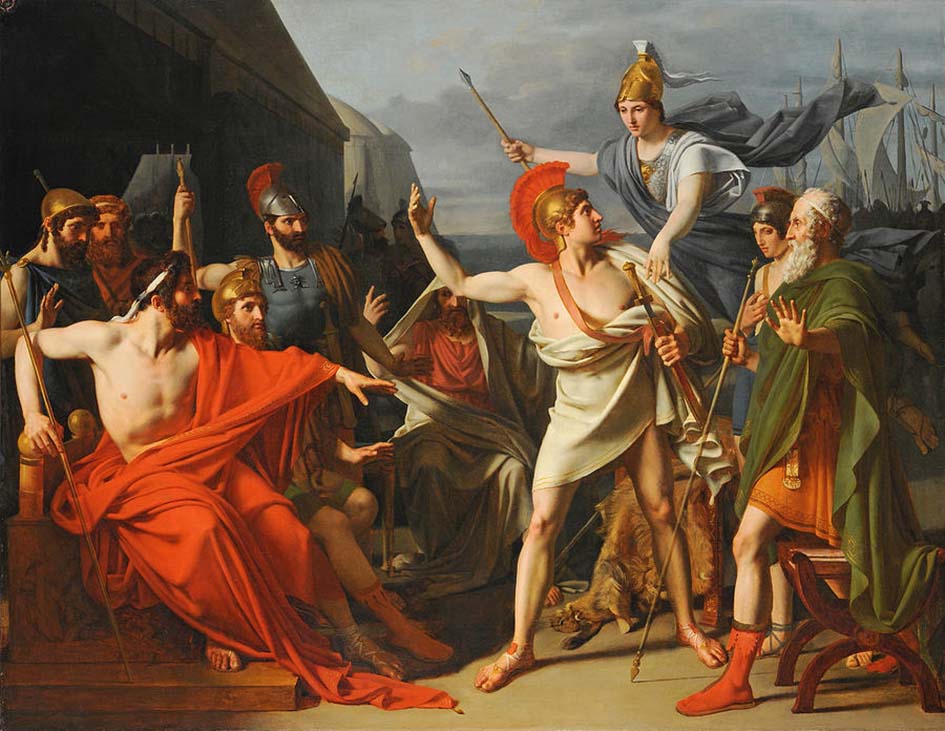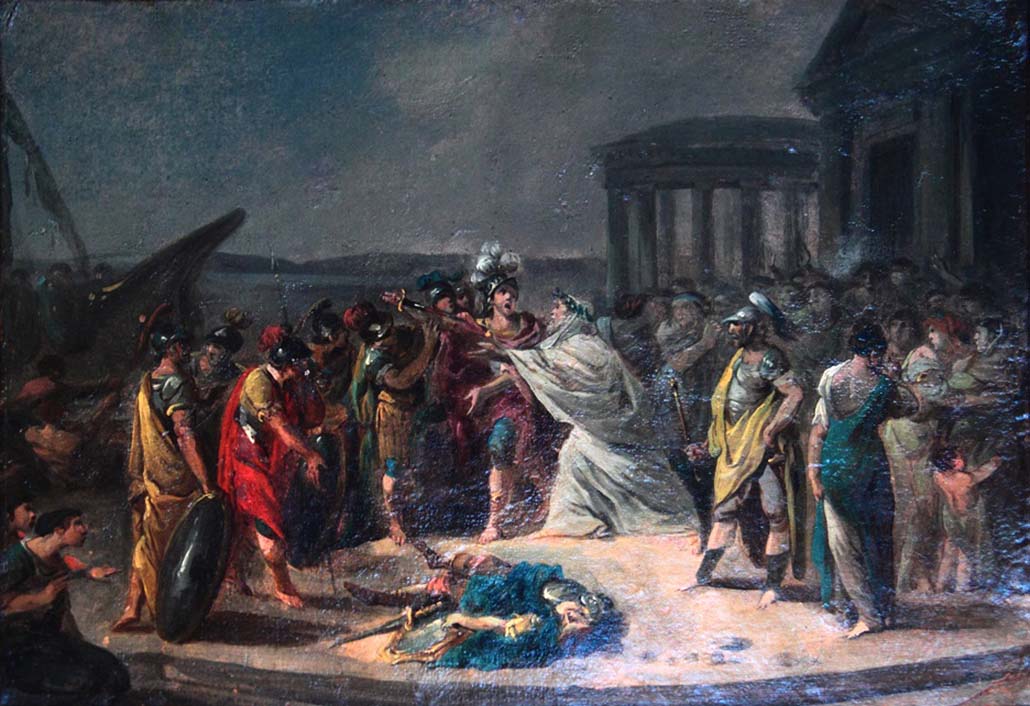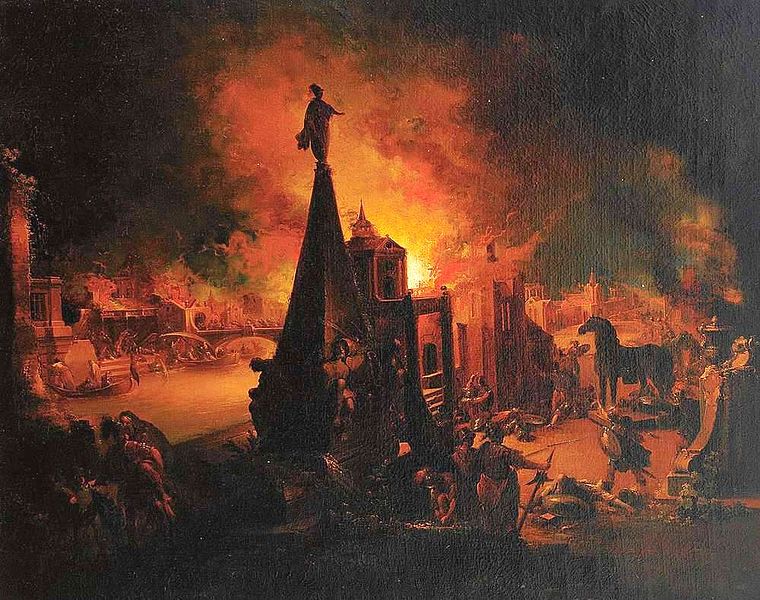Idomeneus
Idomeneus of Crete
In Greek mythology, Idomeneus (Ancient Greek: Ἰδομενεύς) was a Cretan commander, father of Orsilochus, Cleisithyra and Iphiclus, son of Deucalion and Cleopatra, grandson of Minos and king of Crete.
He led the Cretan armies to the Trojan War and was also one of Helen's suitors as well as a comrade of the Telamonian Ajax. Meriones was his charioteer and brother-in-arms.
In short: The reason why Idomeneus had to participate in the Trojan War was because he had been one of Helen's suitors; and when Agamemnon invoked the Oath of Tyndareus, along with all the other Suitors, he had to protect the husband of Helen and to reclaim Helen back (while destroying the city-kingdom that did that – aka, Troy).
Mythology
In Homer's Iliad, Idomeneus is found among the first rank of the Greek generals, leading his troops and engaging the enemy head-on, and escaping serious injury. Idomeneus was one of Agamemnon's trusted advisors. He was one of the primary defenders when most of the other Achaean heroes were injured, and even fought Hector briefly and repulsed his attack.
More specifically: Agamemnon would call upon the Suitors of Helen to gather their forces when Helen was abducted from Sparta, and at the gathering of Aulis, Idomeneus brought with him 80 ships from Crete. The standing of Idomeneus was such, that at one point it was suggested that Idomeneus be the co-commander of the Achaeans alongside Agamemnon, and although this did not come to pass, Idomeneus did become one of Agamemnon’s counsellors.
At Troy, Idomeneus’ nephew, Meriones, acted as charioteer and brother-in-arm for his uncle. Idomeneus was regarded as amongst the bravest of all Achaean leaders, and was one of those who volunteered to fight Hector, the greatest of the Trojan defenders. As one of the bravest of the Greek warriors, Idomeneus was seen as a close comrade of Ajax the Great.
Arguably most noted for defending the boats of the Achaeans during a large counter attack, Idomeneus was noted for his skill with the spear, and killed Phaestus, Othryonues, Asius, Alcathous Oenomaus and Erymas with his weapon.
Like most of the other leaders of the Greeks, he is alive and well as the story comes to a close. He was one of the Achaeans to enter the Trojan Horse. Idomeneus killed twenty men and at least three Amazon women, including Bremusa, at Troy.
Idomeneus though was not one of those who committed sacrilege during the sacking of Troy, and so when the war ended, the gods allowed Idomeneus a trouble free return (Book III of the Odyssey).
In the simplest versions of the Idomeneus myth, Idomeneus simply took up where he had left off as King of Crete and husband of Meda, and when he died, Meriones succeeded his uncle to the throne. Tombs for both kings of Crete were to be found at Knossos, and the two men were revered as Cretan heroes.
A later tradition, preserved by the mythographer Apollodorus of Athens, continues the story as follows: after the war, Idomeneus's ship hit a terrible storm. He promised Poseidon that he would sacrifice the first living thing he saw when he returned home if Poseidon would save his ship and crew.

The first living thing was his son, whom Idomeneus duly sacrificed. The gods were angry at the murder of his own son and sent a plague to Crete. The Cretans sent him into exile in Calabria (ancient name of the Salento in Apulia), Italy and then Colophon in Asia Minor where he died.
According to Marcus Terrentius Varro, the gens Salentini descended from Idomeneus, who had sailed from Crete to Illyria, and then together with Illyrians and Locrians from Illyria to Salento, (in the area of Grecìa Salentina which is in the peninsula of Salento).
Idomeneus though was not said to have stayed in Italy, but travelled on again, returning to Asia Minor to the city of Colophon, down the coast from the ruined city of Troy. Colophon was also the home of another Achaean, for it was also the place where Calchas died.
Alternatively, Idomeneus was driven out of Crete by Leucus, his foster son, who had seduced and then killed Idomeneus' wife Meda and usurped the throne of Crete.
In this version of the myth: Idomeneus unable to regain the throne, he travelled onto Corinth, and there met up with his former comrades Diomedes and Teucer. In Corinth the three were said to have plotted together to regain their lost kingdoms. Some say that Nestor dissuaded the three from acting, whilst other sources claim that plans were put into effect.
Where the plans were made and acted upon, it was said that Idomeneus was actually welcomed back to Crete when news arrived that Diomedes had successfully attacked and retaken control of Aetolia.
Thus as King of Crete once again, Idomeneus was in a position to aide Orestes, when he came to Crete seeking aid of the Cretans and Athenians against Aegisthus back in Mycenae.
Idomeneo, a 1781 opera seria by Mozart, is based on the story of Idomeneus's return to Crete. In this version, Poseidon (Neptune in the opera) spares Idomeneo's son Idamante, on condition that Idomeneo relinquish his throne to the new generation.
Idomeneus (Τrojan)
Illegitimate child of king Priam of Troy
ἐκ δὲ ἄλλων γυναικῶν Πριάμῳ παῖδες γίνονται Μελάνιππος, Γοργυθίων, Φιλαίμων, Ἱππόθοος, Γλαῦκος, Ἀγάθων, Χερσιδάμας, Εὐαγόρας, Ἱπποδάμας, Μήστωρ, Ἄτας, Δόρυκλος, Λυκάων, Δρύοψ, Βίας, Χρομίος, Ἀστύγονος, Τελέστας, Εὔανδρος, Κεβριόνης, Μύλιος, Ἀρχέμαχος, Λαοδόκος, Ἐχέφρων, Ἰδομενεύς, Ὑπερίων, Ἀσκάνιος, Δημοκόων, Ἄρητος, Δηιοπίτης, Κλονίος, Ἐχέμμων, Ὑπείροχος, Αἰγεωνεὺς, Λυσίθοος, Πολυμέδων, θυγατέρες δὲ Μέδουσα, Μηδεσικάστη, Λυσιμάχη, Ἀριστοδήμη.
(Απολλόδ. 3.12.5).

Sources
Robert Palfrey Utter, 1918, Every-day pronunciation, p 127
Tzetzes, Homeric Allegories Prologue 587
Tzetzes on Lycophron, 431
Iliad 2.645
Iliad, repeated appearances
Quintus Smyrnaeus, The Fall of Troy, Book I.
Hyginus, Fabulae 114.
Encyclopædia Britannica
Virgil. Aeneid. Book III, 400.
Scholiast on Homer Odyssey ν 259
Operum quae exstant, p. 174, Marcus Terentius Varro, printed by Christophorus Raphelengius, 1601.
Bibliotheca, Epitome of Book 4, 6. 10













